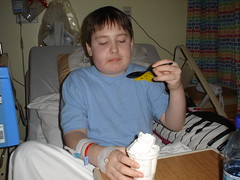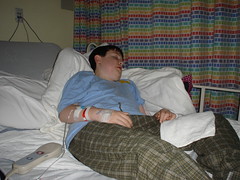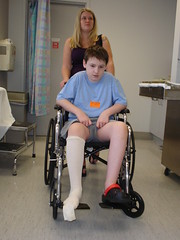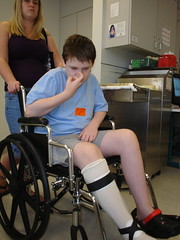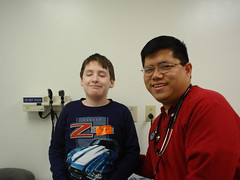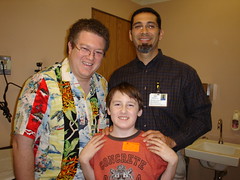Saturday, July 7, 2007
Three days in hospital four wisdome teeth out.....
He had four wisdom teeth pulled and one incisor tooth.
The incisor was not coming down and was trying to pop out on the side of his gums.
I am very curious to find out how much LESS pain medication he will need after having this situation dealt with.
Zachary, had no trouble with his kidneys, or liver....any major organ during or after the surgery.
He was on IV with D10 for the first two days. A nurse told me it's kind of the amount of eating Mcdonalds. That's a lot of energy to his cells. It worked magic.
It could be a new world with out teething worries.
Mom has me in my favorite blue shirt again. It's cozy enough to sleep in.
Monday, June 18, 2007
Getting a new brace for foot drop
He can walk so much better and for longer periods at a time with a brace on his foot.
I found out I can have some extenions made on the straps of his shoes.
Just a visit to a quality shoe repair will save me the cots of buying two different sizes of shoes. This gets hot in the summer so finding high quality sandals was a priority.
I got some Hush puppies sandals in a wide shoe store. On sale for about $80.00. How much have I spent /wasted on trial and error, looking for something that will work out that he is willing to wear?
Lets say I could probably pay rent with the last years shoe budget.
Ps that's the beautiful and helpful nanny in the back .... she just wrote a paper on Zach.... I hope she lets me post it. : )
He's grown so much this is our second brace.
I didn't know Complex Regional Pain Syndrome could last this long.
It's been a year and a half.
Thursday, June 7, 2007
I ripped this from Pub Med My story on Cyclic Vomiting Syndrome will be attached to the end.
Boles RG, Adams K, Li BU.
Pub Med
Division of Medical Genetics and the Saban Research Institute, Childrens Hospital Los Angeles, Los Angeles, California, USA. r.boles@chla.usc.edu
Cyclic vomiting syndrome (CVS), characterized by severe discrete episodes of nausea, vomiting, and lethargy, is a fairly common, disabling, predominately-childhood condition most often associated with migraine and dysautonomic features. Our group recently reported that children with CVS and additional neuromuscular disease manifestations demonstrate strong maternal inheritance of multiple disease manifestations and abnormal urine organic acids, suggesting the presence of predisposing mitochondrial DNA (mtDNA) sequence variants. In order to determine if maternal inheritance is present in CVS in general, a clinical interview was administered regarding 80 unrelated individuals with CVS ascertained randomly from the database of the Cyclic Vomiting Syndrome Association (CVSA). Disease manifestations consistent with potential mitochondrial dysfunction were far more common in matrilineal (sharing the same mtDNA sequence) versus in non-matrilineal relatives, including mothers versus fathers (P = 3 x 10(-9)) and maternal versus paternal grandmothers (P = 2 x 10(-6)). Maternal inheritance is suggested in 52% of the 23 subjects with two or more neuromuscular abnormalities ("CVS+") and in 54% of the 44 subjects without any neuromuscular abnormalities ("CVS-"). In both the CVS+ and CVS- sub-groups, subjects, and affected matrilineal relatives of all ages suffer at a far higher incidence from several dysautonomic-related conditions, including migraine and irritable bowel, as well as depression and hypothyroidism, while neuromuscular and cognitive disorders such as hypotonia and ADHD are common only in affected children. We conclude that mtDNA sequences predispose towards the development of protean disease manifestations in CVS patients ascertained through a disease-specific association, as well as among their matrilineal relatives, whether or not neuromuscular disease is present in the proband. Since CVS was absent in all but one matrilineal relative of our probands, CVS is apparently a rare clinical presentation in individuals carrying the predisposing mtDNA sequences. The four conditions reported most frequently among the matrilineal relatives of our cases, migraine, depression, irritable bowel, and hypothyroidism, are known to segregate together in families, and our findings suggest that a common predisposing genetic factor is likely present on the mtDNA. (c) 2005 Wiley-Liss, Inc.
Every summer I carry a very long bucket with us everywhere we go. The bucket has to be long enough to handle the g force of Zach's projectile vomiting. He threw up so much in one of my cars that we had to get rid of it. It was disgusting! So long to the Saturn! Now I have learned. You must have tinted windows. You much have a powerful airconditioner. You must have pro sport quality sunglasses. Cold water near by. Limit the glare. Glare will set it off. One you vomit or get a headache you will have more trouble getting stable again than the trouble it takes to prevent the start of vomiting. Sometimes it 's a smell or a picture os something and you can't always control everything. I do everything EVERYTHING I can to prevent the vomiting. Taking the Co Q 10 and L Carnitor can help you ward off the vomiting. Zachary likes a cool cloth on his neck. When I fail to prevent vomiting, I sometimes use Zofran disolvable to help stop the cycle.
Zachary has become more aware of his cyclic vomiting syndrome. He knows when he might be sick he might get the bucket or try to tell me he's sick. Instead of just letting it fly like a baby would. It's always worth the extrea effort to prevent stressing the body and setting off a migraine or a cycle of vomiting.
Thursday, May 17, 2007
Foot X Rays
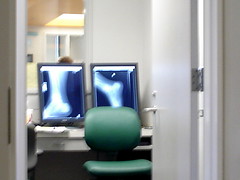
Zach's foot bone
Originally uploaded by jippyjabber.
These are Zachary's X Rays.
I was across the hall but could not resist snagging a photo and hoping you can tell it's a foot! We are off to the hospital today and we should have some blood test results in. Answers or more questions but at least things are bieng done and we are going forward.
The doc can blow up the zxray and really take a close look at the bones. Zach's bones have osteopeana. Low bone desity. He needs to work out and I think he will be put on some supplements for it. I am not sure how much radiation I was exposed to that week. He also had mouth X rays taken as well as multiple X rays of his foot.
T
Sunday, May 6, 2007
Love on 4 Paws Zach and Mattie
What makes it tolerable? A dog of course!
Mattie's story
Love on 4 paws is a terrific organization. The kids really do feel better after petting the dogs.
I often think that one day Zach will have a dog and we will be able to visit seniors or kids stuck in the hospital. I will never forget the first dog Zach met at a Hospital. It happened to be at Huntington Hosp. I had called 911 because he was turning blue. He had not slept for days. They admitted us and a dog camee to visit. I threw a blanket on the floor. The dog and Zach laid down and for the first time in days and days, Zachary fell asleep. So did the dog!
We've met Mattie before. We have a picture of zach and Mattie on the cell phone. So Zach was comfortable with her and took her leash and walked her around the waiting room and told her she was a good girl.
Mattie is a featured story on www.Loveon4Paws.org go check it out.
if you have a sweet dog and are interested in volunteering, you will find information on that on the site.
Sunday, April 22, 2007
Zachary to Mad World by Michael Andrew & Gary Jules
Zachary set to Mad World. Zach has a tooth that has to be pulled because there is not enough room for it to come in. It' s triggering his pain disorder. He's very brave. The video lost quality when it was compressed. Technically, it's a mess but I still like it....... Isn't that so typical Jippy?
Saturday, April 14, 2007
What is a mitochondrial disorder?
Mitochondrial diseases result from failures of the mitochondria, specialized compartments present in every cell of the body except red blood cells. Mitochondria are responsible for creating more than 90% of the energy needed by the body to sustain life and support growth. When they fail, less and less energy is generated within the cell. Cell injury and even cell death follow. If this process is repeated throughout the body, whole systems begin to fail, and the life of the person in whom this is happening is severely compromised. The disease primarily affects children, but adult onset is becoming more and more common.
Diseases of the mitochondria appear to cause the most damage to cells of the brain, heart, liver, skeletal muscles, kidney and the endocrine and respiratory systems.
Depending on which cells are affected, symptoms may include loss of motor control, muscle weakness and pain, gastro-intestinal disorders and swallowing difficulties, poor growth, cardiac disease, liver disease, diabetes, respiratory complications, seizures, visual/hearing problems, lactic acidosis, developmental delays and susceptibility to infection.
